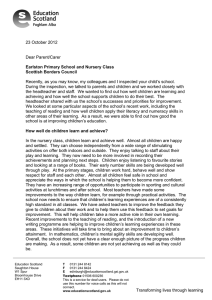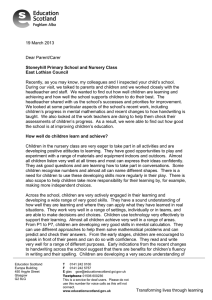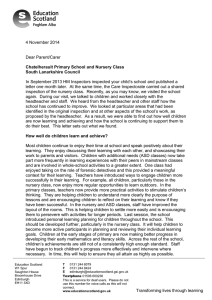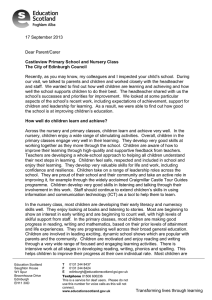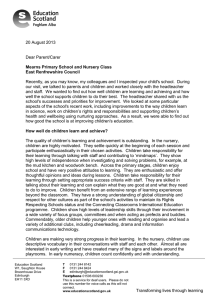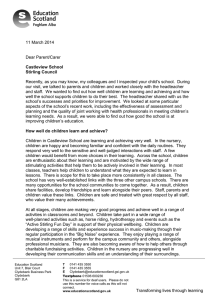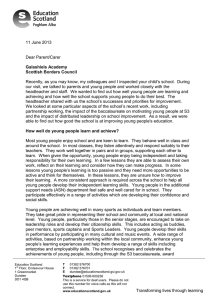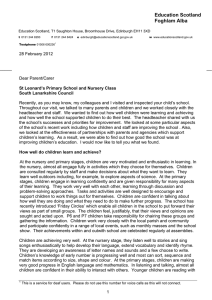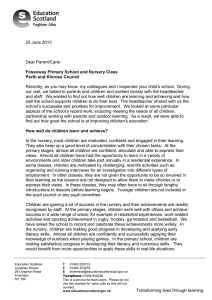21 May 2013 Dear Parent/Carer
advertisement
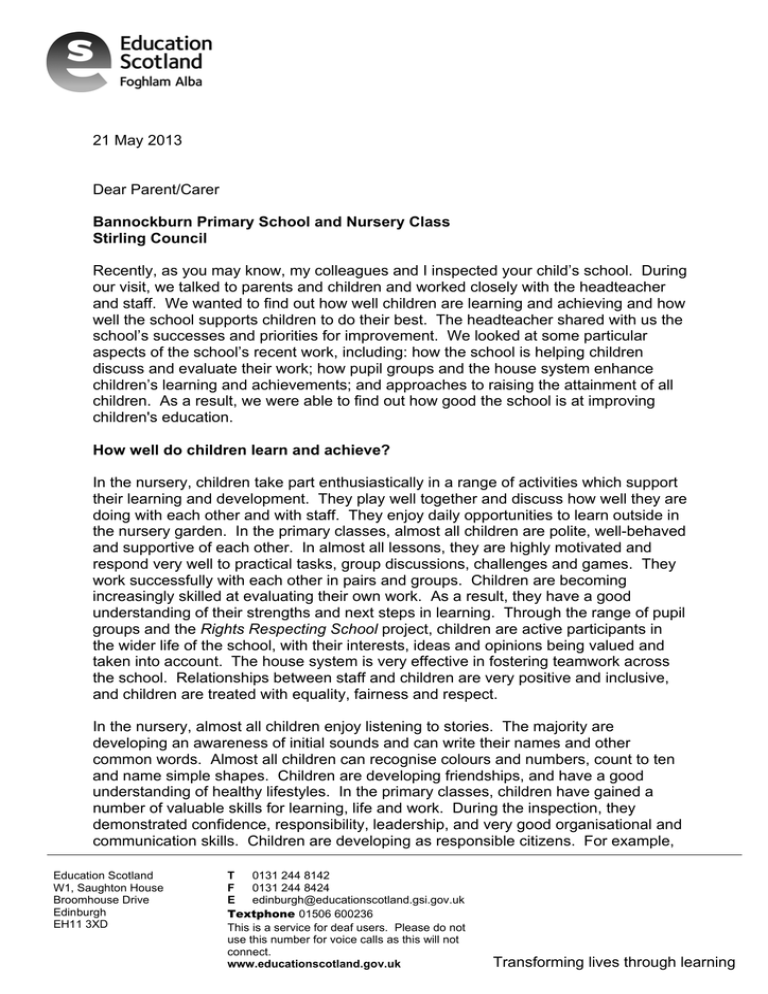
21 May 2013 Dear Parent/Carer Bannockburn Primary School and Nursery Class Stirling Council Recently, as you may know, my colleagues and I inspected your child’s school. During our visit, we talked to parents and children and worked closely with the headteacher and staff. We wanted to find out how well children are learning and achieving and how well the school supports children to do their best. The headteacher shared with us the school’s successes and priorities for improvement. We looked at some particular aspects of the school’s recent work, including: how the school is helping children discuss and evaluate their work; how pupil groups and the house system enhance children’s learning and achievements; and approaches to raising the attainment of all children. As a result, we were able to find out how good the school is at improving children's education. How well do children learn and achieve? In the nursery, children take part enthusiastically in a range of activities which support their learning and development. They play well together and discuss how well they are doing with each other and with staff. They enjoy daily opportunities to learn outside in the nursery garden. In the primary classes, almost all children are polite, well-behaved and supportive of each other. In almost all lessons, they are highly motivated and respond very well to practical tasks, group discussions, challenges and games. They work successfully with each other in pairs and groups. Children are becoming increasingly skilled at evaluating their own work. As a result, they have a good understanding of their strengths and next steps in learning. Through the range of pupil groups and the Rights Respecting School project, children are active participants in the wider life of the school, with their interests, ideas and opinions being valued and taken into account. The house system is very effective in fostering teamwork across the school. Relationships between staff and children are very positive and inclusive, and children are treated with equality, fairness and respect. In the nursery, almost all children enjoy listening to stories. The majority are developing an awareness of initial sounds and can write their names and other common words. Almost all children can recognise colours and numbers, count to ten and name simple shapes. Children are developing friendships, and have a good understanding of healthy lifestyles. In the primary classes, children have gained a number of valuable skills for learning, life and work. During the inspection, they demonstrated confidence, responsibility, leadership, and very good organisational and communication skills. Children are developing as responsible citizens. For example, Education Scotland W1, Saughton House Broomhouse Drive Edinburgh EH11 3XD T 0131 244 8142 F 0131 244 8424 E edinburgh@educationscotland.gsi.gov.uk Textphone 01506 600236 This is a service for deaf users. Please do not use this number for voice calls as this will not connect. www.educationscotland.gov.uk Transforming lives through learning the Community Carers and eco groups organised a successful ‘litter pick’ in a local park. Older children act as ‘squaddies’, supporting positive activities in the playground. Children listen well to each other and to adults in a wide range of situations, and are able to answer questions confidently. Children in P4 can differentiate between fact and opinion, and justify their reasoning. By P7, children are developing debating skills and can offer persuasive arguments about important issues. The annual ‘Book Extravaganza’ has led to positive attitudes to reading amongst children across the school. Children have produced high-quality writing for a range of purposes, for example explanations of learning in mathematics, fact-files on inventors, and comic strips detailing the massacre of Glencoe. Through the ‘Meaningful Maths’ approach, children are developing very good skills in numeracy and applying them well across other areas of the curriculum. They are skilled and confident in mental calculations. Children use ‘restorative conversations’ to resolve conflicts. They are developing an understanding of their feelings and emotions and how to manage them. Children in P7 record and reflect their achievements in well-structured profiles. How well does the school support children to develop and learn? The school is successful in its aim of developing children’s literacy, numeracy and health and wellbeing to ensure that they are all able to learn and achieve. Staff in the nursery and in the primary classes are committed to on-going evaluation and review of the curriculum, to ensure it takes account of Curriculum for Excellence and meets the needs of all children. They are currently working together to develop programmes for social studies; science; and religious and moral education. These developments are already having a positive impact on children’s experiences and achievements, notably in social studies. During the inspection, children in P4 benefited from a session delivered by Bannockburn Heritage Outreach staff, and those in P7 from input by the Scottish Parliament Outreach service. In the nursery, a few planned activities in science need to be more relevant for children. The Parent Council has run successful workshops for parents on aspects of health and wellbeing, notably internet safety. There is scope for them to focus more on helping parents understand new developments in the curriculum. Children have very good opportunities to make links across their learning through well-planned interdisciplinary projects. These include stimulating art and design work in the context of social studies and literacy. Effective arrangements are in place to support children as they enter and move on from nursery; as they move to the “big playground”; and as they move into secondary school. In the nursery, staff take very good account of individual children’s needs in planning activities, including a suitable level of challenge for children. At the primary stages, the school’s approaches to meeting children’s needs are sector-leading. In almost all lessons, the highly-skilled class teachers provide a wide range of well-structured, relevant and interesting tasks and activities which meet children’s needs very effectively. The school uses a range of very effective approaches to identify, review and evaluate children’s learning needs. Staff support the needs of different groups of learners very well. For example, principal teachers provide carefully targeted support for children in writing attainment groups. Support for learning staff work very successfully with children in need of a range of support in class, at the Pit Stop, and in the ‘Super Group’ for children in early years. The ‘Get, Set, Go’ group helps identified children to improve their confidence and physical coordination. The school reviews the deployment of support staff on a regular basis to meet the on-going and arising needs of children. The needs of looked-after children are well met and their progress is kept 2 under close scrutiny. The school works very effectively with a range of partner agencies to support children who are experiencing barriers to learning, and their families. How well does the school improve the quality of its work? The school’s approaches to evaluating its own work, with the aim of ensuring continuous improvement, are excellent. Teachers regularly observe each other in lessons. They work very well together to share good practice, improve teaching programmes and to develop a shared understanding of the standards required in children’s work. All teachers regularly evaluate their own performance and identify individual targets for improvement. Senior managers observe lessons, sample specific aspects of children’s work and provide very helpful feedback to teachers. The headteacher and class teachers regularly discuss children’s progress, as result of which some are identified for additional support. These discussions are supported very effectively by a new system for monitoring and tracking children’s attendance and attainment. The school has worked hard to involve parents in the life of the school. Parents are regularly asked for their views, notably at parents evenings when they are surveyed by P7 children. As a result of parental feedback, the school has taken action to improve, for example by revising homework guidelines. The highly-effective headteacher is strongly committed to meeting the needs of children, and to nurturing creativity in her staff. She is a very good role-model for staff who are themselves developing as leaders. The two depute headteachers provide very good support for the headteacher, and are very effective in their respective roles. Teachers value the opportunities they have for professional development and reflection. This inspection found the following key strengths. • • • • • • The strongly positive and inclusive ethos. High-quality learning experiences provided for children in many lessons. Children’s engagement in learning, and their wide range of achievements. High levels of support for children to enable them to learn and achieve well. Teamwork of staff and their commitment to continuing school improvement. The leadership of the headteacher. We discussed with staff and the education authority how they might continue to improve the school and nursery class. This is what we agreed with them. • • Continue work to ensure consistently high-quality learning experiences for children. Continue to develop the curriculum, taking account of Curriculum for Excellence What happens at the end of the inspection? We are very satisfied with the overall quality of the school’s work. We are confident that self-evaluation processes are leading to improvements in children’s learning experiences and achievements. As a result, we shall make no further evaluative visits in connection with this inspection. During the inspection, we identified aspects of 3 innovative practice which we wish to explore further. We shall work with the school and Stirling Council to record the innovative practice in order to share it with others. Jane B Renton HM Inspector Additional inspection evidence for your school such as details of the quality indicator evaluations can be found on the Education Scotland website at: http://www.educationscotland.gov.uk/inspectionandreview/reports/school/primsec/Ban nockburnPrimarySchoolStirling.asp If you would like to receive this letter in a different format, for example, in a translation please contact the administration team on the above telephone number. If you want to give us feedback or make a complaint about our work, please contact us by telephone on 0141 282 5000, or e-mail: complaints@educationscotland.gsi.gov.uk or write to us addressing your letter to the Complaints Manager, Denholm House, Almondvale Business Park, Livingston EH54 6GA. 4
